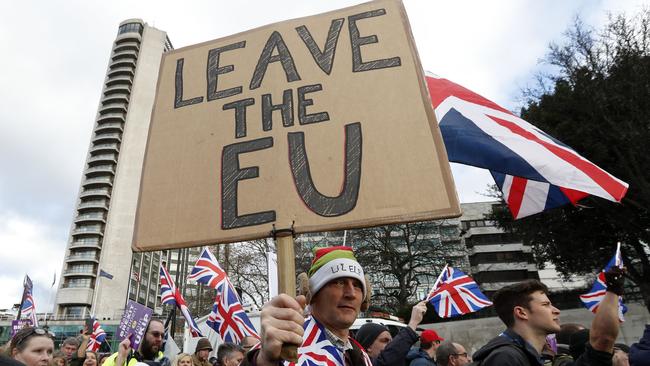Desperate Theresa May forced to defer Brexit vote
Theresa May has recognised the political catastrophe of a massive defeat of her Brexit Withdrawal Bill and will defer the vote.

British Prime Minister Theresa May has recognised the political catastrophe of a massive defeat of her Brexit withdrawal bill and is to defer the vote to try and gain acceptable concessions from the European Union.
In dramatic developments, Mrs May held an emergency hook-up with her cabinet just a day before the vote — hailed as the most important in a generation — was to be put to Westminster. She was due to make a statement to the House of Commons in the early hours Australian time detailing that the vote was to be deferred. Her executive was urgently setting out a new timetable to try to get a deal through parliament.
Mrs May will now head to Brussels ahead of a European summit later this week to try to extract an addendum or change to the deal. Critically, the Irish backstop, which handcuffs the UK to the EU indefinitely if the backstop is initiated, is seen as the most important aspect of the deal that has to be rewritten to try to gain enough support from the Tory backbench to enable Brexit to go ahead.
Mrs May’s manoeuvring has temporarily headed off a humiliating and career-ending dismissal of the Brexit deal but her problems have only just started. She has already run into a firm EU, which says the backstop arrangement is not negotiable. Jean Claude Juncker’s office has said the deal will not be changed.
Ireland Foreign Minister Simon Coveney said: “The deal is not going to change. Particularly the legal language of the withdrawal treaty. I hope people will see it for what it is, which is a fair, balanced document.’’
The move comes after the European Court of Justice ruled that Britain could unilaterally stop the Article 50 process, without needing the permission of the other EU member states, if it occurred before March 29.
If the parliament was to go down this route, the court has ruled that Britain would remain in the EU on the same terms it had before the referendum.
“The Full Court has ruled that, when a Member State has notified the European Council of its intention to withdraw from the European Union, as the UK has done, that Member State is free to revoke unilaterally that notification,” the ECJ ruled.
The ruling has buoyed Remainers who are calling for a second referendum to reverse Brexit, but the timeline to conduct such a vote would be tight.
Earlier, Mrs May began informal approaches to the European Union to try to amend the deal. She spoke to the European Council president Donald Tusk and the Irish Taoiseach, Leo Varadkar. But Brexit secretary Stephen Barclay warned that if the government demanded revisions to the Brexit deal it would ignite an opportunity for various EU countries to also insist on wholesale changes.
“The risk for those who say simply go back and ask again, the risk is that isn’t necessarily a one-way street,’’ he said. “The French, the Spanish and others will turn round, if we seek to reopen the negotiation, and ask for more.’’
But the palpable anger towards the government, and Mrs May, who is openly called treasonous by members of the public for failing to deliver a palatable Brexit, could only intensify if another of her red lines or promises is broken. The Labour Party was also considering its response, including a possibility of calling for a vote of no confidence in the government, which could ultimately bring about a general election.
The parliament, which is more sympathetic to Remain, is no closer to having a Plan B or consensus on any options, be it Norway-style or Canada-plus arrangement. Even with the deferral, the country is thrust into unknown territory with a range of options from no Brexit to no deal to a second referendum.
Behind the scenes senior Tories have been manoeuvring for leadership of the party if Mrs May cannot get the Brexit vote passed.
Boris Johnson, Dominic Raab and Esther McVey are three of about eight possible candidates if Mrs May is forced to resign.
“We must take on Brussels with steel and unity when the PM’s deal is voted down,’’ said Johnson, suggesting he would be the one to be able to do it.
The Tory former attorney general Dominic Grieve has warned the fierce split in the Conservative opinions over Brexit threatens a more permanent division of the party.
He told Sky News: “There is a risk the party will split and cannot continue in its current form.”
He added: “I can see that this is of such a fundamental character this issue that it may be the end of the Conservative party in its current form, and that bothers me very much because one of the products of Brexit has been total paralysis on virtually every other area of policy.’’





